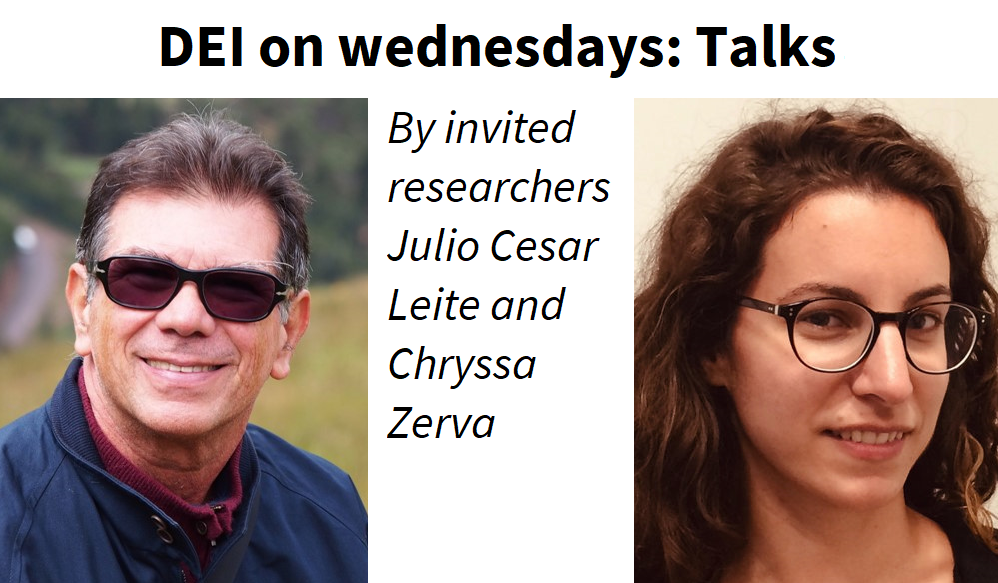DEI at Wednesdays: Talks, 19-01-2022

Julio Cesar Leite: Towards Citizens: A View from the Merry-Go-Round of Information Systems (IS) <∞> Requirements Engineering <∞> Software Engineering
Abstract: The experience on amalgamating knowledge from these three areas supported the vision that we face a huge challenge in designing IS that recognizes citizens as a central concept. But why, IS should be concerned with citizens? Well, as the integration of IS and social media increases, the push to a more virtual world will require more attention to social qualities. This is already showing up, as CRM systems need to mine Twitters, and new legislation, around the world, are demanding more privacy, more transparency, more safety, more sustainability. On the other hand, the complexity of supporting products allows for various kinds of disruption on IS. Our vision is anchored on research on four classes of problems: the knowledge gap among organizations and software producers, the shallow vision that modeling should be centered on the function-data duality, the lack of traceability among the strategic vision to the operational reality, and the educational failure in dealing with abstraction. This talk will revise advances made, as an anchor for future research.
Bio: Leite is a holder of an Cnpq (Conselho Nacional de Desenvolvimento Científico e Tecnológico / National Council for Scientific and Technological Development) researcher grant since 1990. Founding member of the IFIP 2.9 Working Group. Member of the Departamento de Informática (Informatics Department), PUC-Rio for 32 years, and member of the Instituto de Matématica e Estatistica (Mathematics and Statistics institute) of UERJ (State University of Rio de Janeiro) for almost 30 years, responsible for the Information Systems course. Hold visiting positions at Universidade de São Paulo, Universität Kaiserslautern. Fraunhofer IESE, ECI - Universidad de Buenos Aires, University of Toronto, and Università degli Studi di Trento. Served as a reviewer for journals such as: ACM Transactions on Management Information Systems, Information Systems Journal, Business Process Management Journal, Interacting with Computers, and the IEEE Transactions on Software Engineering. Served as Program Committee member of more than 170 conferences / workshops. Leite’s peer-reviewed publications include papers in Portuguese, English, and Spanish. There are 48 journal articles, 14 book chapters, 206 complete articles in congresses and workshops, and 40 short articles in congresses and workshops. According to DBLP, Professor Leite has more than 200 co-authors.
--
Chrysoula Zerva: Quantification of textual uncertainty in the biomedical domain
Abstract: I will present a roadmap of my career so far and a preview of future plans, attempting to draw a link between the different research projects, underpinned by the uncertainty theme. I will discuss key findings of my PhD work on quantification of textual uncertainty in the biomedical domain, and demonstrate the impact of including uncertainty estimates on biomedical pathway models. I will also briefly present follow-up work on automatically identifying textual evidence for a scientific statement. We will then move to current work on quantification of model uncertainty with a focus on trustworthiness of MT evaluation models. Finally, I will discuss how this work relates to the broader scope of my research interests, such as fairness, explainability and continual learning.
Bio: Chrysoula (Chryssa) Zerva is a post-doc researcher in the DeepSPIN group at the Instituto de Telecomunicações and Invited Assistant Professor at the DEEC department in Instituto Superior Técnico in Lisbon. She obtained her PhD from the University of Manchester in 2019 and was subsequently awarded the EPSRC doctoral prize fellowship and a chance to look into the propagation of scientific misinformation in text. She is intrigued by the concept of uncertainty, both in terms of textual statements and model predictions. She is keen in exploring the concepts of uncertainty, fairness and explainability in NLP and textual representations and is currently focussing on Machine Translation (MT) evaluation. Chryssa is also interested in the communication of scientific knowledge, both in terms of teaching and science dissemination to the public; she has thus co-organised and presented in events such as the Pint of Science and events to encourage the participation of women in science.
